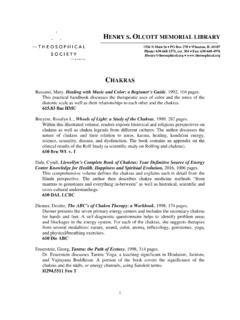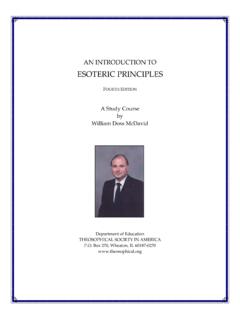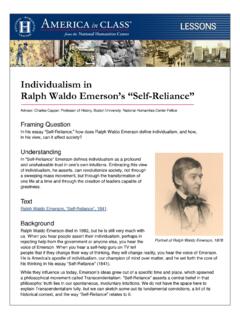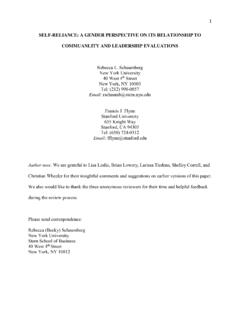Transcription of Paradox of Grace and Self-Reliance
1 Published in the December 1971 issue of The Theosophist. THE Paradox OF Grace AND self -RELIANT EFFORT. (KRIP AND PURUSH RTHA). By I. K. Taimni Even among those who recognize the spiritual nature of humanity and the possibility of our knowing directly the Reality, which is hidden within the universe and ourselves, there are two schools of thought with regard to the methods by which this knowledge may be obtained. According to one, our spiritual progress depends entirely upon the Grace of God, or Krip , as it is called in Sanskrit. This Grace descends upon the devotee due to the beneficence of God and is not due necessarily to any merit earned by him through self -reliant effort, or Purush rtha.
2 According to the other school, the descent of Grace depends entirely upon our self -reliant effort and the karma generated by it, and therefore the Grace of God really has no place in our spiritual unfoldment and its consummation self -Realization. The truth underlying both these extreme positions transcends both views and reconciles them in a deeper perception of the spiritual facts of existence. This Paradox is really a dvandva, or pair of opposites, which the intellect poses for us owing to our limited vision. It can be completely resolved only when we are able to transcend the intellect and perceive that reality from which the dvandva is derived by a process of polarization.
3 As our attitude in this matter is bound to profoundly affect our life and the means we adopt for unfolding our spiritual nature, it is necessary for us to consider this question carefully and arrive at definite conclusions if we are to avoid drifting, which always results when our mind is confused and uncertain about the course of action that we should take in a particular matter. We may not be able to know the real truth hidden within the Paradox , yet by clarifying our ideas and understanding the problem, we can steer a middle course with faith and confidence. That the Grace of God sometimes descends suddenly and raises the devotee to high states of exaltation and enlightenment is a fact of experience, and it is useless to deny it.
4 But the impression that it descends without any cause, which is widely prevalent among the followers of certain schools of Bhakti Yoga, cannot be considered as quite correct. This idea cannot be accepted as it is, because it implies that God has favorites and His Grace is showered upon them in an arbitrary manner. The wide prevalence of the idea and its unquestioning acceptance by a large number of aspirants may be attributed to two causes. One is that it frees the aspirant from all personal responsibility in the difficult task of unfolding his or her spiritual The Theosophical Society in America nature and the necessity of undertaking the systematic self -discipline, which this requires.
5 It accords with the general tendency in human beings to get something for nothing without paying its fair price. The other cause is that on most occasions the Grace of God descends upon the devotee rather suddenly without any apparent immediate cause. It does not generally follow periods of strenuous endeavor but comes without any warning when the devotee is comparatively relaxed and expects it the least. In order to understand these phenomena and to account for them on the basis of our knowledge concerning the inner realities of existence, let us consider very briefly the few fundamental facts that determine the events and their sequence in the life of an individual.
6 These facts are well known to students of Theosophy and therefore only a brief reference to them should suffice. The first and the most basic factor in the life of a human being is the Divine Plan and its unfolding according to the Divine Law of unfoldment generally referred to as Ritam in Sanskrit. In its broad outline, the sequence of events in any manifested system is determined by this unfolding process in the Divine Mind. Within the broad framework of this Plan and its orderly unfoldment are evolving countless Monads 1 in order to unfold their spiritual nature and to become capable of taking more and more important parts in the drama of the universe.
7 The evolution of these Monads does not take place in a haphazard manner but according to the eternal Divine pattern, which is hidden within each Monad and is unique in the case of each one. This eternal Divine pattern within each Monad also exercises an inexorable influence on its evolution and to a considerable extent determines the course and nature of its lives, especially in the advanced stages. How the lives of countless Monads are coordinated, how their individual uniqueness is able to find expression, how they are able to fulfill their appointed destiny in spite of all these complications all these are fascinating mysteries of spiritual life of which the materialist can have no conception.
8 But it should be clear to the student that it is only in a Cosmos, at the basis of which there is only One Supreme Consciousness and one guiding Power, that this is possible. The third important factor which determines the events and course of lives in the case of each human being is their Karma, the totality of impressions and potentialities produced by the forces they have set in motion by their thoughts, emotions and actions in their present and past lives. These accumulated potential forces called V san s in the Yoga-S tras can be precipitated in the form of experiences and faculties 1.
9 Monad: a word of Greek derivation meaning an indivisible unit. In Theosophical writings, a technical term used to refer to the immortal part of a human being that reincarnates. 2. The Theosophical Society in America in a particular life only when appropriate conditions for their working out are present, as has been pointed out in aphorism IV-8 of the Yoga-S tras: From these (accumulated V san s) only those tendencies are manifested for which the conditions are favorable. These favorable or appropriate conditions are provided in the pr rabdha 2 that each human being brings with them in each incarnation, and their external life has to be lived more or less within the framework of this karmic pattern.
10 It is necessary to dwell momentarily on one aspect of the law of Karma, which has special bearing on the particular question that we are considering in this article, namely, the relation of Grace and self -reliant effort and their respective functions in the life of an aspirant. It is frequently observed in natural phenomena that even with the repeated and continuous application of a force or stimulus in any direction, the effect of such an application does not appear immediately. It is only in the case of chemical, physical, and mechanical phenomena that the effect follows the cause immediately, though in these fields, too, this does not always happen.












